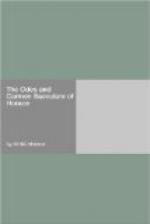You shoot; she whets her tusks
to bite;
While he who sits to judge the fight
Treads on the palm with foot so white,
Disdainful,
And sweetly floating in the air
Wanton he spreads his fragrant hair,
Like Ganymede or Nireus fair,
And vainful.
It would be possible, no doubt, to produce verses better adapted to recommend the measure than these stanzas, which are, however, the best that can be quoted from Francis; it might be possible, too, to suggest some improvement in the structure of the fourth line. But, however managed, this stanza would, I think, be open to two serious objections; the difficulty of finding three suitable rhymes for each stanza, and the difficulty of disposing of the fourth line, which, if made to rhyme with the fourth line of the next stanza, produces an awkwardness in the case of those Odes which consist of an odd number of stanzas (a large proportion of the whole amount), if left unrhymed, creates an obviously disagreeable effect. We come then to the other alternative, the stanza with alternate rhymes. Here the question is about the fourth line, which may either consist of six syllables, like Coleridge’s Fragment, “O leave the lily on its stem,” or of four, as in Pope’s youthful “Ode on Solitude,” these types being further varied by the addition of an extra syllable to form a double rhyme. Of these the four-syllable type seems to me the one to be preferred, as giving the effect of the Adonic better than if it had been two syllables longer. The double rhyme has, I think, an advantage over the single, were it not for its greater difficulty. Much as English lyric poetry owes to double rhymes, a regular supply of them is not easy to procure; some of them are apt to be cumbrous, such as words in-ATION; others, such as the participial-Ing (dying, flying, &c.), spoil the language of poetry, leading to the employment of participles where participles are not wanted, and of verbal substantives that exist nowhere else. My first intention was to adopt the double rhyme in this measure, and I accordingly executed three Odes on that plan (Book I. Odes 22, 38; Book ii. Ode 16); afterwards I abandoned it, and contented myself with the single rhyme. On the whole, I certainly think this measure answers sufficiently well to the Latin Sapphic; but I have felt its brevity painfully in almost every Ode that I have attempted, being constantly obliged to omit some part of the Latin which I would gladly have preserved. The great number of monosyllables in English is of course a reason for acquiescing in lines shorter than the corresponding lines in Latin; but even in English polysyllables are often necessary, and still oftener desirable on grounds of harmony; and an allowance of twenty-eight syllables of English for thirty-eight of Latin is, after all, rather short.




